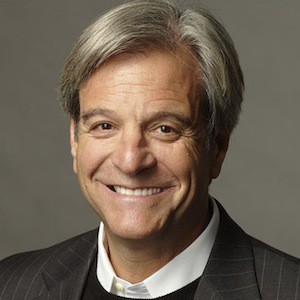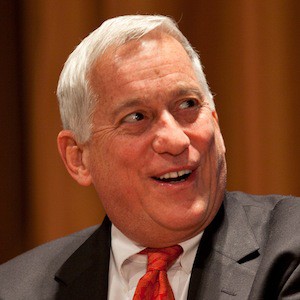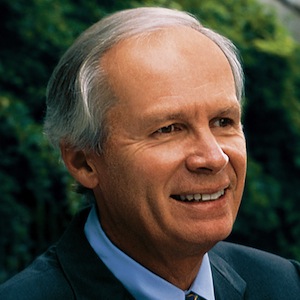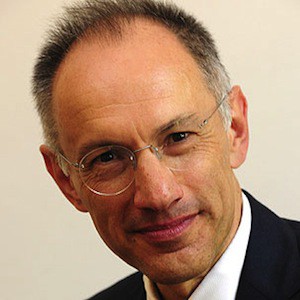John: Deal that was.
Esther: Well, yeah, I’d comped the fall of my freshman year.
Basically, my Harvard experience was the Crimson, it really wasn’t
Harvard. I never went to class, I proofread for money, I wrote news
stories for love. Then I started doing mostly movie reviews.
After I got out of college, well, I took six months off to
write free. He was actually a Crimson alum. Nowadays, he would be
called a sexual predator, but then, he was just a dirty old guy. I
worked for him, he was a stringer for the National Catholic News
Service and he had some other clients. I got to interview
Bernadette Devlin, who is in the Irish Parliament.
Then I went back and finally graduated. Then I got sort of
dish-washing jobs for two years, and finally ended up as a fact
checker for Forbes, where I formally joined the Holy Church of
Journalism as an altar boy, and worked there for three years.
And I loved it. But by the end, I realized, even at Forbes,
they were more interested in kind of crafting a story than in really
telling the truth.
I thought I’d go somewhere where telling the truth and
making judgments and uncovering things really mattered, so I went
to Wall Street. There again, I discovered it was mostly, as
sell-side analyst, you were selling stocks with a story rather than
actually trying to figure out what was going on.
So then I joined the newsletter, where it really wasn’t a
newsletter, it was more like a monthly analysis of the structure of
a rapidly changing marketplace, which at that point, was the
personal computer and the software business and then became the
internet and online.
John: You were one of the first, in a way, who created your own
personal brand with the newsletter. That it really became…My
journalism path has been more of institutions, where the
institution mattered more. You were precursor in all points, that
it’s your image, your word, your statement that matters, not the
institution’s.
How did that feel? Is that different?
Esther: Interestingly, the thing I joined was named after Ben Rosen,
who started it. It was the Rosen Electronics Letter, and it was
Rosen Research. After about a year, it became clear that he had a
huge conflict of interest because he was also Chairman of Lotus and
Compaq, just journalism things.
We tried to sell it to Business Week, and I think, to either
Ziff Davis or Pat McGovern. Then I thought…Ben is, he’s handsome,
he’s rich, he’s famous, he’s powerful. But still, I was working
with him in the office. He was definitely just a human being. I
thought, “If he can do it, I could, too.”
I said, “Well, why don’t I buy it?” I did. Then I took over
and I carefully renamed it EDventure and Release 1.0 without
my name visibly in it on purpose.
But at the same time, the first year I wrote a review, I
think it was of the Macintosh an d Steve Jobs gave me a horrible time.
He said, “You’re masquerading your crummy, stupid opinions as those
of Ben Rosen.” I was like, “Dude, I renamed the thing. I’m not
trying to pretend to be Ben Rosen, I’m trying to establish myself.”
But now, everybody thinks I founded the thing and I keep
correcting them. But no, Ben founded it and then it changed
personality with somebody else.
But people become institutions in a way that they didn’t
used to. I mean, that’s one of the fundamental things of the
Internet, you can…instead of this whole thing about the theory of
the firm, the reason you have a firm or an institution is because
it’s cheaper in terms of time and resources and everything else, to
have this institution, because it’s too hard to get all those
resources out in the market place.
But now that’s changed. Any individual has access to the
world’s greatest libraries, they have an accounting system back-end
to manage their business if they need it, they have distribution
channels, so the individual becomes primary.
John: Did you have any Eureka moment? When did you sort of realize
that the present is not going to be the future in a major way?
Esther: Not really. So another thing,in addition to calling me the
founder and people call me a futurist…I always like to say, “The
goal is really to understand the present.” You still can’t predict
the future, but you can explain the different ways in which it
could unfold, when it’s possible and when isn’t. There really isn’t
that much change as much as there is an unfolding of the internal
dynamics. That’s a fine point, but it’s still…
John: It’s still legitimate.
Esther: Yeah. It’s not, “Oh can you predict the future,” or suddenly
everything changed. It’s more, “What were the structural movements
that led to this transformation?”
John: How did that epiphany or that knowledge unfold?
Esther: For me there weren’t that many epiphanies because I never…
John: Because you never thought…
Esther: I never had this notion that I knew what was going on, or
that I could predict the future, so it wasn’t like, “Oh my god, I
was wrong.” It was more like…I don’t really know what’s going to
happen, but here’s… Again, it’s more trying to figure out what’s
going to happen, and how.
The one epiphany I had was every year, because I inherited
PC Forum from Ben Rosen, and we started with the hardware panel,
which at one point it was John Roach from Tandy, it was Rod Canion
from Compaq, it was the guy, whoever it was of that particular year
from IBM. And bout three years in, this hardware panel was so boring
because fundamentally nothing changed. But it was always the
hardware panel, the software panel, and other stuff.
I had a dream that I was kind of running PC Forum but I was
also on a beach. And, I was with this hardware panel and was
beginning to slide into the ocean, and there was a woman from Regis
McKenna who raised her hand and said, “But this is what you wanted,
this hardware, isn’t it?” Then I realized that I’d liberated myself
by starting with the software panel, with Bill Gates, and…
John: That’s a vivid dream .
Esther: That’s probably the one real understanding the software
business, the big thing was the change in software distribution
from disks to downloading. Also the change what compatibility did
for PCs so you could run across machines. Then there were things
that weren’t really epiphanies, but you needed to understand the
big machines versus the decentralized small things.
Then of course the Internet and basically the change in
balance of power between the individual and the institution, or the
world at large.
John: With that, other than that, do you see hallmarks, do you see IBM?
Are there memory spurs such as AOL Time Warner, such as Facebook,
such as the end of Lotus, that trigger that confirm for you? When
these episodes occur, did they signal you in your path, did they
signal you a new inflection point?
Esther Dyson: They were just milestones, in a sense. One of the more
interesting things that happened that was unremarked at the time
was when you originally started on email there was MCI Mail, there
was CompuServe, there was the actual internet.
And t was incredibly difficult to communicate from one to
another. You had your CompuServe friends. Then I learned how to do
the “@” addresses so you could take someone who’s on CompuServe and
you could…
John: Address it to them.
Esther: Yeah, and it would go…Sort of in the same way, in 1989 I
went to Russia. Before that, I had an MCI Mail address. When I was
in Russia, it was amazing because you could not call people. Once I
left, when I tried to get…The only way to communicate with people
was email. The Russians all had email addresses because the phone
system was so bad.
I first used it mostly with Russians. Meanwhile, in Russia,
they were using UUCP. The only way to get out of the country was
through NIPAS, which was basically a government network that
connected to Vienna where there was some kind of nuclear institute
and then you could get out to the rest of the world.
About 1989, 1990 some guy in Finland called Johan
Helssingius, Julf Helsingius who later ran something called
Anon.penet.fi. He created a direct connection to the university in
St. Petersburg where there was a guy called Leo Tomberg, who was an
Estonian. And suddenly you could actually get onto the real Internet
from inside Russia.
John: And that was…?
Esther: That was more of an inflection point. That was where the
technology really created that big shift.
John: Let’s talk about commentators and journalists who are
watching what was going on. You talked about your relationship with
Steve Jobs when you wrote that. Do you think we’ve reached a world
where companies feel they don’t need journalists? You were a go-
-between, you are between them and their audience.
Esther: They don’t need journalists for PR. They still need them,
one, to figure out what’s going on in other companies and to the
extent that they really want to understand the world.
The role of journalists has changed. It used to be every
journalist did some analysis and some of just what’s happening. The
what’s happening part is easier. Fundamentally, you can use an
algorithm or a filter to read all the press releases or all the
rewrites of the press releases.
But you still need a Kara Swisher to get the scoops. You
need, whether it’s Om Malik or somebody to tell you what is really
important versus what people are following. And then the thing that’s
most missing, which is not what happened last week but what
happened last year. Again, what does this mean? Not necessarily
10 years in the future, but what is actually happening this year.
Suddenly mobile…everybody’s telling you mobile’s
important. But what it really means is that all the new stuff is
mobile first. It doesn’t just change “oh, mobile is hot, you should
invest in it,” it changes the importance of SEO and marketing.
There was something you were talking about yesterday. It changes
how apps are found.
But at the same time, a more interesting change is, for the
last 10 years, people have been better at getting their calendars
managed. You now get memos and invitations, and put them
automatically into your calendar.
Just enough so that I never trust my calendar, they don’t
do the time adjustment correctly. I end up being in Chicago, and my
meeting is wrongly listed as being at 9:00 AM, and it’s really 8:00
AM Chicago time and I’m late or whatever.
But I would say probably a lot of 20-year-olds don’t look
at their calendars, because they expect to get alerts from
somewhere or push notifications, if you like. Suddenly, people no
longer consult their calendars. They wait to be told. And if
they’re not told, then they miss their meetings.
In that case, how do you as a vendor of some kind or a
party planner…. the world’s changed again.
John: Interesting. You had said the world has changed
for you and for me, in the sense that when
you use to do a piece of analysis, it would be a page to 2-1/2 pages
long. We’ve now gone from sites where people look first at
something in a headline, something first paragraph to a world where
they follow you on tweets. How does that change in
attention span, how do we grapplle with that journalism?
Esther: That’s a real challenge. First, there’s an awful lot of
people out there who don’t really understand the world. Sometimes,
I wonder well what’s in their minds. Of course, 50 years ago what was
in their mind was “I Love Lucy” and the President is important. So
maybe, people weren’t that broad visioned either, but the world has
definitely gotten more complicated. I don’t really know. That’s the
biggest challenge.
It still matters to understand the big picture. There’s
just a bigger gulf between people who think and then people who are
just floating on the flow.
John: You would argued at one point in a blog post, that
readers need to read more critically. Now that anyone can say
they’re a journalist, it’s up to the readers to read more
critically and determine if they are. Have you seen any strides in
that direction?
Esther: The readers need to be fact checkers.
John: Fact checkers.
Esther: Sometime ago, we realized the readers need to be skeptical
about advertising. Now, first they need to be skeptical about
whether what they’re reading is advertising. They also need to be
skeptical about where the stuff they’re reading comes from. It’s
not suddenly simply skepticism that is the motivation here, but
where does this come from, does this person get it, or are they
blinded by…
John: This prejudice or whatever.
Esther: They’re blinded by the perch they’re standing on, but the
second is, simply, you need to provide your own context. The Tweets
need to come into something that you have constructed if you’re not
going to read the context around it as you would in a normal news
story.
John: Yeah. That’s true.
Esther: But it’s much easier to find that context than it used to
be. It used to be pick up “The New York Times,” and if you hadn’t
been following the story.
John: That was the purpose of The Times then. The purpose of The
Times in time to come may be slightly different.
Esther: The purpose of The Times, on the one hand, is the support
of its shareholders and family to uphold. The thing that in fact is
a fundamental thing is, take any institution it has multiple
purposes depending on either the onlooker or the participant.
The purpose of The Times for the customer, the purpose of
The Times for the people that write about it, the purpose of The
Times for its employees, for its owners. That’s not different but,
again, it’s getting more complicated because, that horrible
word stakeholder, actually, there are
more stakeholders in most of these things because institutions used
to be discrete objects. They had shareholders, customer, employees,
but they were pretty well defined.
That’s one of the difficulties. All these porous boundaries
around everything.
John: As you know, there has been a change in audience for
journalists. The audience, when we began, used to be faceless. They
used to be a mass.
Esther: They would listen to you politely.
John: They would listen to you politely. Now that’s not the case.
Esther: No, also, one of the more interesting things about social
media, especially in countries like Myanmar or Russia, people are
writing their own history. They used to depend on the official
version written by official people.
Now you have something that’s much more incoherent, more
genuine, but not necessarily clear or…
John: Or necessarily accurate.
Esther: Not necessarily accurate. The problem is the accuracy is so
multilateral and so heterogeneous that only a journalist god
could……
Accuracy has to incorporate a lot more different strands.
In the old days if there was a single narrative you were either a
good part of it or you were some little outlier, but now, again,
history itself becomes decentralized.
John: Yeah, very much. It’s fascinating because it is not just
the audience, not just the journalists, all of this is journalistm.
As you said, it’s the unfolding early on.
People would look back and say, “How did we cover this
era?” “How good a job did we do over the last 20, 25 years of
describing what’s going on and the meaning behind it?”
Esther: Some people who are doing that very well, but they might
not necessarily all be being listened to. One thing I was talking
about and thinking about last night in this conference.
One of the big controversies right now is, “Oh my god,
Facebook is manipulating people’s emotions.” They’re not adding
anything. They’re selectively eliminating either people saying, “I
had a great time vacation. It was so wonderful,” or people saying,
“Oh, I’m really sad. My dog died. I’m just in a bad mood today.”
Those comments are contagious. There’s still a question
about, “Are people feeling impelled to present themselves as more
cheerful when their friends do, or are they actually being cheered
up?” I suspect they’re changing how they present themselves, rather
than how they feel. I think they probably feel worse.
The problem is, what people don’t get, is there is no
default. You are being manipulated.
I cannot create Facebook without manipulating people. If
I’m making no choices, I’m drowning in information. If I’m making
choices to present the friends they like, as indicated by “likes,”
I’m creating a filter bubble for them. I’m cutting them off from
the rest of the world they might see.
The challenge is how do you act in a world where you have
more knowledge and more responsibility? That’s what we’re really
facing.
We know now about children being abused in Ethiopia. We know
that if you go to half the places in the United States, if you
walk into a school, you see children’s lives being blighted
by careless teachers, by bad parenting, by bad food.
You can predict that. What is your responsibility to
intervene? And if you intervene, then you’re responsible for
intervening well.
People who pay attention at all are facing this crisis of
knowing too much, being too aware, being complicit in so many bad
things. If you walk away, in theory, you’re leaving a default, but
you’re leaving something that you should feel guilty about.
John: At the same time, you’re in a world where the user of social
network, by default, doesn’t necessarily care for authority, but
cares more for the peers and the friends. There’s not an authority
to trust out there. I respond more to my friends.
Esther: And are they better or worse than the authority, who knows?
It’s kind of like, “You can’t be fired for picking IBM.” You can’t
be blamed for trusting the authorities, but maybe you should have
been, especially in Germany during the war.
John: Right, exactly. To circle back, you said you think some
people have done an admirable job of covering this evolution, but
are not necessarily being listened to.
Why do you think that is? One would think the accurate
information and good predictions always should create a following
and an audience that grows over time.
Esther: There’s s difference between accurate information and
vision around the context. If you want to be in journalism the best
business model is writing about business because there’s somebody
wiling to pay for accurate information.
“Yeah, I really do need to know whether oil prices are
likely to go up or down based on what’s happening in the Gulf and
in Canada. Is fracking going to be regulated? I’ll pay for that
info.”
John: There’s a premium for accurate information. That’s right.
Esther: A premium about the philosophical, ontological state of the
world? It’s harder to get people to pay for that, partly because
everybody’s competing to provide this for free… McKinsey
Global Institute promoting McKinsey, universities (promoting)
people with grants.
There are different kinds of journalism. There’s the
“rewrite the press releases.” There’s investigative journalism,
find out what people don’t want you to know. Some people will pay
for that sometimes. Probably the best business model for that in the
in the end is philanthropy. It’s definitely not government support.
Then there’s the maunderings of the philosopher..that’s
research institutions, center for the arts and society kinds of
things. Then there’s stuff about Jennifer Aniston and product
reviews. That’s very, very fund-able through advertising.
I love watching the way “USA Today” has really become a
traveler’s newspaper. They cover the airline industry and the
weather exceptionally well…and sports.
John: Yeah, because that’s their audience.
Esther: Right, whereas “The Post” is inside Washington.
John: The Times is The Times. There’s been a greater focus on
these as a measure of “How do I exist in the future?”
Esther: Yeah, because the advertising…You no longer have the
classifieds supporting all the other stuff. It gets unbundled and
the things that are not supportable need to go to Jeff Bezos, or
Paul Steiger (sponsors) or whatever.
John: Final question. Are you optimistic? Pessimistic? What do
you think about journalism in the…?
Esther: Fundamentally I’m an optimistic person because that’s the
only way to be effective in the world. You have to be cynical, yet
optimistic. About journalism? There’s a holy church of journalism,
which isn’t doing that well, but there is, if you like, the faith,
or the religion of journalism, which is searching for the truth.
That still exists and it will persist.
The truth is two things. One, it’s the perception of the
present accurately and, two, it’s the unfolding of the present into
the future. The present will always unfold into the future.
John: Whether you are there or not.
Esther: Yeah, and whether you understand it or not. Of course, some
part of journalism is even understanding the past, not just the
present.
As long as there are people out there to think about the
state of the world, there’s somebody interested in perceiving the
truth. The truth will always exist. The perception of it is what
we’re talking about.
John: But will the…
Esther: Will that perception be spread widely by journalists? Yeah,
to some audiences. I’m spending a lot more time out in the sticks
of the U.S. Just as I learned about Sri Lanka, maybe I’m going to
learn about Jackson, Tennessee or Clatsop county, Oregon.
It’s easy to be dismissive. It’s not just easy, it’s
tempting to people on the coasts to think the people in the middle
don’t get anything, and they do.
Yet, at the same time, you can live a life where you don’t
really need to pursue the truth, you can just exist within it.
John: It’s easy, but I think that ambition to pursue exists in
you, exists in me, and exists in others of our world.
Esther: It also exists in people who want to understand what’s
going on. You may not need to understand what’s going on in
Washington, maybe if you just understand what’s going on in your
own community, and you think skeptically, “What is the mayor really
trying to do?” That’s seeking the truth.
But it probably helps to see it in the context of American
history, economics, sociology, psychology, all these other things
that really affect how all this stuff works.
John: Because it’s all pointillistic. All these have little paths
impacts on understanding. Will the news business ever be the same?
Esther: No. Totally. It’s not the same now. It’s the fragmentation
into both different topic areas and, again, different purposes,
different motivations. They become so fragmented. The
purposes and the coverage areas and the financial models have all
split this thing apart.
John: Someone said recently: do you think journalism was bound to
fail? Because that drive to get it right — TK, which you mentioned
— means you can’t really be a beta culture? You can’t be a beta
because of willingness to fail, whereas in journalism, the drive is
always to get it right.
Esther: That’s somebody’s mistaken vision of journalism, as the
printed word that cannot be updated. There’s some people in the
news business whose drive is to get it right, as opposed to people
who are comfortable unpacking it in public and then correcting it.
Whether I spelled the guy’s name yesterday or I was wrong last
year, but that’s not journalism.
Everything can redefine itself. There’s the news business
as it was. There’s journalism as the — I would call it a trade, of
finding out what’s going on and reporting it. And then there’s
truth-seeking, which will persist regardless. Finding out what’s
going on and reporting it is a trade that’s changing dramatically,
but it will survive as well. The news business, per se, won’t.
John: Thank you very much.
Esther: Thank you. This was fun. I have’t done this public speaking
in a while.










